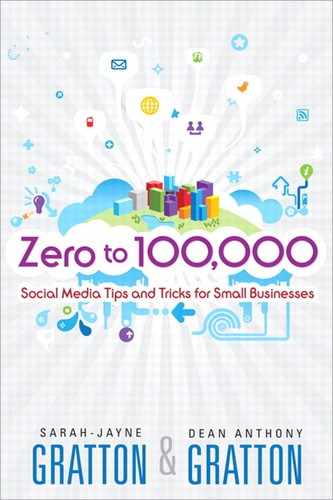7. Foursquare: Putting Your Brand on the Map
Foursquare is focused on growth...getting merchants to think about the Internet is a big step.
—Dennis Crowley, founder of Foursquare

A Little History
Foursquare (Foursquare.com) has taken the social media world by storm over the past year. The service was created in 2009 by former mobile gaming designer Dennis Crowley and Naveen Selvadurai. As of December 2010, the company reported it had five million registered users.1
What Makes Foursquare Different?
Foursquare is different from the other platforms in that it offers a new blend of geo-tagged social networking, status updates, business review, and location-based gaming. If you’re not already familiar with it, take the time to get to know it now, as it may turn out to be a great business ally.
Unlike the other social media platforms covered in this book, Foursquare is first and foremost an app that runs on your location-aware mobile device. It enables users to find out what’s around them in the “real world,” share their activities and locations with their contacts, and compete with each other by earning points and unlocking badges. Foursquare’s ever-increasing popularity provides a great opportunity for businesses to promote themselves to a new audience and a new way to reward loyal customers.
It’s worth mentioning here before you read on that Foursquare isn’t a great platform for all businesses. As you will glean from the following, at present, it is predominantly used by bars, restaurants, and coffee shops, so depending on your business, it might not be the right platform for you.
Getting Started with Foursquare
Foursquare offers two types of platform for businesses. The first is the venue/merchant platform, from where special offers and incentives can be made directly via the venues themselves. The second is brand promotion using badges (as shown in Figure 7-1).
Figure 7-1. The two types of business options provided by Foursquare.
(Source: Foursquare.com/business)
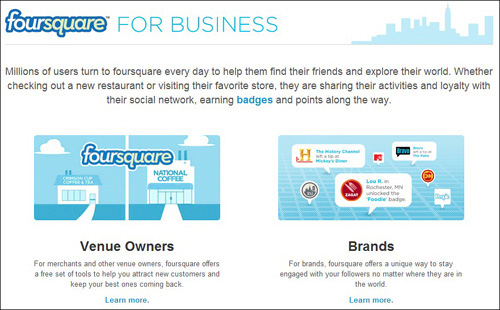
To get started, log on to foursquare.com/business, and the two options will appear. Now just select the best option for you, and Foursquare will provide a mini-tutorial, showing exactly what each of the business services offers and allowing you to sign up there and then. If you are a merchant or venue, you can immediately search for your virtual place on Foursquare using their Search and claim your venue button (see Figure 7-2).
Figure 7-2. Foursquare’s merchant platform allows you to search and claim your venue in the virtual world.
(Source: Foursquare.com/business/venues)
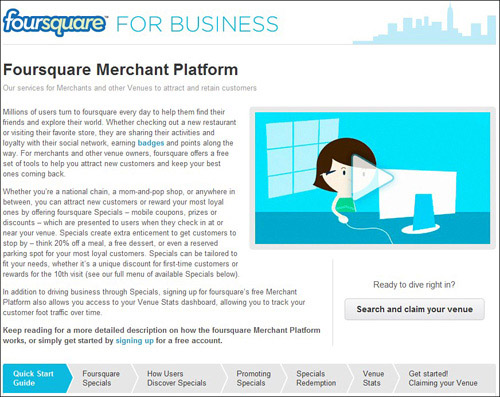
Foursquare’s merchant platform enables you to track your customer traffic over time and is a great social metric tool.
In addition to driving business through specials and brand badges, signing up for Foursquare’s free merchant platform also allows you access to your Venue Stats dashboard, enabling you to track your customer foot traffic over time (see Figure 7-3).
Figure 7-3. Foursquare enables merchants to view their stats, which include top visitors and most recent checkins.
(Source: Foursquare.com)
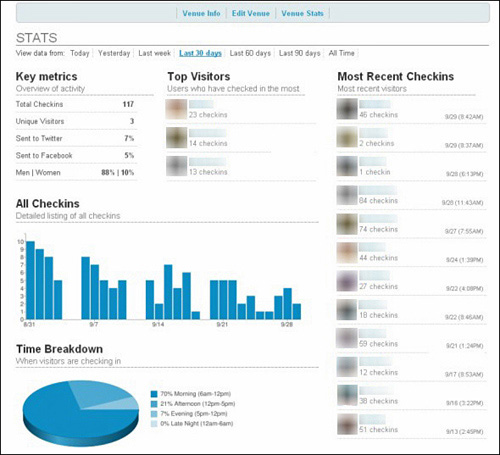
How to Get the Best Out of Foursquare
1. Provide near-to checkin offers: When Foursquare users enter a business, one of the first things they do is checkin via the Foursquare app on their mobile device. This alerts the user’s friends, telling them where the user is and offering them points. When users do this, they’re also telling Foursquare their exact location. Because of this, Foursquare offers a service that allows businesses that are nearby to promote themselves. For example, if you run a coffee shop close by, you can set up a system via Foursquare that sends a message to anyone who checks in to your business. This message can (and should) include some kind of promotion via notification on Foursquare, such as “We see that you just checked in to Ray’s Bookstore down the street. When you’re done, stop by the Happy Coffee Shop for a free slice of cake with any two coffees ordered.”
2. Give rewards for new checkin customers: Another neat trick of Foursquare is its ability to track how many times a user has checked in to a place. So to encourage new business, why not do a promotion that rewards users for their first checkin at your business?
3. Discounts for recommendation: Foursquare users are heavily encouraged to leave recommendations (or tips), as shown in Figure 7-4. They are garnered by businesses offering incentives, such as “10% off your bill if you show the cashier that you have just posted a favorable tip.” Businesses participating in Foursquare are also given the ability to post sponsor tips about their own venues or what to do in the area.
Figure 7-4. Foursquare encourages merchants to reward users who give recommendations or tips.
(Source: Foursquare.com)

4. Reward the Mayor of your Foursquare venue: Foursquare effectively keeps track of who’s checked in to your business the most, and that person is deemed to be the Mayor. This can create real excitement and competition among users while at the same time keeping customers coming back to earn their Mayorship. It can work wonderfully well for those businesses that encourage and promote this activity. We’ve seen several restaurants and bars achieve this by offering to buy the Mayor’s first beer on each visit for as long as he remains Mayor. Figure 7-5 shows an example of this.
Figure 7-5. You can reward the Mayor of your venue with exclusive offers.
(Source: Foursquare.com)
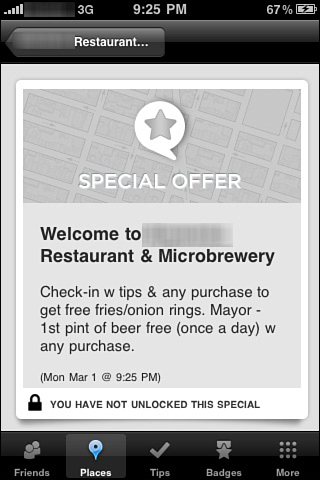
5. Sponsored badge: Another great way to promote your business is by sponsoring a badge (see Figure 7-6). Foursquare users earn badges based on their platform activity. There are many badges built in to the system already, but businesses are free to sponsor their own. As an example, let’s say you own a chain of bakeries in your community. You could sponsor a badge that users can only earn after they’ve checked in to each individual store.
Figure 7-6. Badges are a great way to spread your brand identity.
(Source: Foursquare.com)

Foursquare has definitely brought home the business benefits of location-based social networking, and with companies such as Facebook and Yelp both trying to create their own versions based on its success to date, it’s pretty obvious this type of platform is here to stay.
So now that you have all you need to make a decision about choosing the best platforms for your brand and the knowledge to get started on each of them, it’s time to move on to another hugely important social media marketing tool: your blog.
